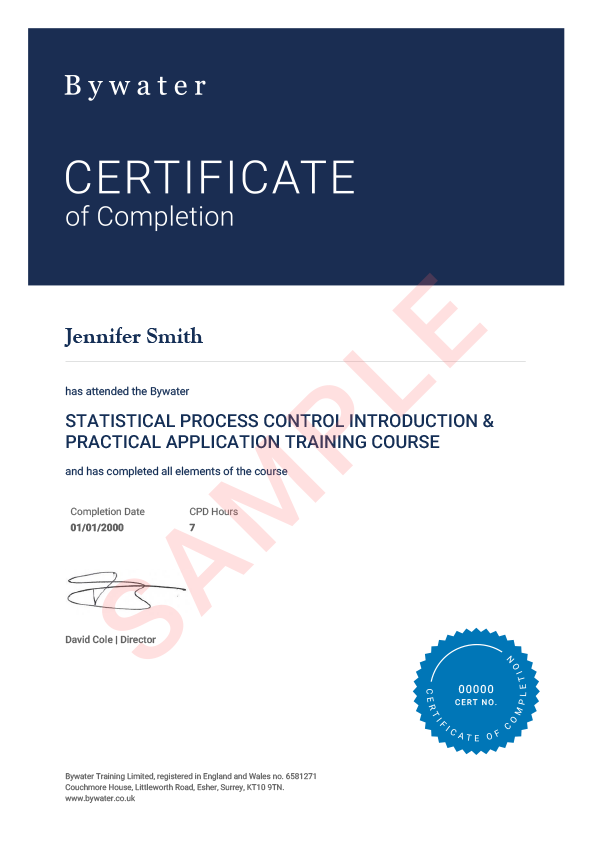Statistical Process Control - SPC Training Course
DURATION
1 dayCPD
Equivalent to 7 hoursCERTIFICATES
All delegates will receive a certificate on completion.DELIVERY OPTIONS
Gain a basic understanding of the principles of statistical process control (SPC) and the methodologies for performing capability studies on our Statistical Process Control training course.
By the end of the course delegates will understand:
- the basic requirements of SPC
- concepts including variability, stability and capability
- comparison of variable and attribute data
- process capability
With a knowledge of SPC delegates can help to maximise profit through improved product quality, greater productivity, streamlined processes, reduced wastage and reduced variation.
- individuals involved in manufacturing, quality, inspection, design/process engineering
- those who are required to develop and interpret control charts
Participants are encouraged to bring their laptop computer or a calculator with basic statistical function for use in the practical workshops.
Additional core tools courses include Introduction to APQP and PPAP, Failure Mode and Effects Analysis (FMEA), and Measurement Systems Analysis (MSA).
Benefit from discounts when booking Core Tools training. If you book any 2 Core Tools training courses together, you will receive a £100 discount.
If you would like to receive training in all 5 Core Tools – APQP & PPAP, FMEA, SPC and MSA – take a look at our Core Tools Package, offering significant savings over booking the 4 courses separately.
- the existence and measurement of variation
- concepts
- variation
- data tables, histograms and run charts
- normal distribution
- accuracy and precision
- measures of variation (mean, mode, median, range, standard deviation and variance)
- understanding and managing variation
- common and special causes
- taking appropriate action on common and special causes
- process improvement methodology
- reacting to special causes
- statistical control: what it is and the advantages of processes being in control vs tampering with the process
- role of control charts
- role, uses and definition of control charts
- types of control charts
- X-range charts
- use of charts
- preparation and use of control charts
- examples
- measures of variation (mean, mode, median, range, standard deviation and variance)
- attributes charts
- c, p, np and u charts (overview)
- examples
- capability analysis
- process capability
- performing a process capability study
- WELCOME AND INTRODUCTIONS
- Module 1 Processes and Measurement Variation
- Workshop 1 The Normal Distribution
- Module 2 Ways of Describing Data
- Module 3 Steps for construction of Control Charts, Variable and Attribute Charts
- Workshop 2 Control Chart Construction
- Workshop 3 Control Charts
- Module 4 Analysis and Interpretation of Charts
- Module 5 Attribute Charts
- LUNCH
- Workshop 4 Selecting an Appropriate Control Chart
- Workshop 5 Attribute Control Charts
- Module 6 Process Capability
- Workshop 6 Calculation of Capability Indices
- Workshop 7 Control Chart Interpretation
- Review & Evaluation
- CLOSE
The exact order of events may be adjusted to best suit the chosen delivery method.
- generate, utilise and interpret a variety of control charts (Xbar/R, S and attribute)
- perform a capability study and determine process capability indices (Cp, Cpk, Pp and Ppk)
- interpret the results in the context of the process variation and product acceptance criteria
Delegates will also receive a certificate of completion, which recognises their new knowledge of statistical process control.

Upcoming course dates










If you are involved in engineering and/or are required to develop and interpret control charts, you may already have some knowledge of statistical techniques.
However, this is not a requirement of attending the course. Your tutor will explain all the concepts and their practical application that are important to statistical process controls. This includes basic techniques such as variation and distributions, as well as control charts.
Delegates on this course have the opportunity to reinforce the classroom learning with a range of practical exercises, helping to ensure they do understand and can employ the techniques being taught.
While we offer courses for a range of Core Tools you can choose your own priorities for training.
Our complementary Core Tools courses cover:
- Failure Mode and Effects Analysis (FMEA)
- Measurement Systems Analysis (MSA)
- Advanced Product Quality Planning (APQP) and Production Part Approval Process (PPAP)
If you would like to book 2 courses, you will receive a £100 discount if booked at the same time.
You may like to book all 4 courses. By selecting our Core Tools Package option, you can receive all these courses at a significant discount.
Yes, Bywater provides certificates for delegates to courses to confirm attendance and new skills learned. We will send the certificate to you or the course booker after the course has been completed.
This course is equivalent to 7 hours CPD.
Requests for feedback are issued to all delegates at the end of our courses. We ask for suggestions for improvement which we work hard to implement, but we are always delighted to receive positive comments.
Previous attendees have highlighted the helpfulness and patience of the tutors, who are seen as enthusiastic and approachable, and always willing to answer questions. The examples used by the tutor and the workshops are also praised as helping to reinforce learning.
Overall, past delegates have felt confident to apply their learnings at work, with feedback such as:
- ‘I needed a deeper understanding of SPC from a theoretical point of view – and this is what I got!’
- ‘The course was very useful as I had no prior knowledge of SPC.’
- ‘It gave me confidence to use what I have learnt when auditing.’
- ‘I learned a lot more than expected.’
Customer reviews
MTE Heat Treatment Ltd|15th Dec, 2025
RLC Ronaldsway|11th Dec, 2025
RLC Ronaldsway|10th Dec, 2025
Krohne Ltd|30th Oct, 2025
Hitachi Rail Limited|29th Oct, 2025
Krohne Ltd|20th Oct, 2025
Luxfer Gas Cylinders|7th Oct, 2025
ITM Power UK Limited|26th Sep, 2025
ITM Power UK Limited|23rd Sep, 2025
Crane Building Services & Utilities|3rd Sep, 2025
Mettler Toledo|28th Aug, 2025
Baxi Manufacturing|27th Aug, 2025

